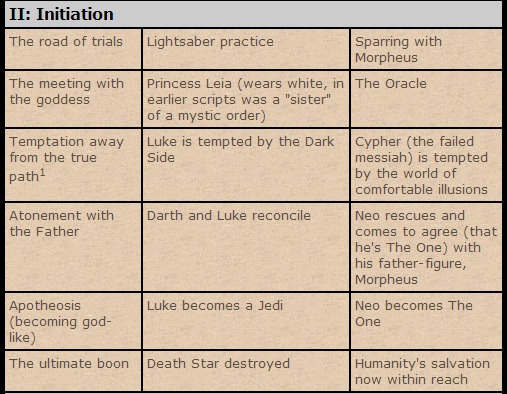Writing shortly after the carnage of World War Two ceased, Joseph Campbell released The Hero With A Thousand Faces. He contended that there is a fundamental narrative that is told and retold throughout the great stories of history. Beginning with Bart Homer and stretching forwards to airport bookstore paperbacks and Kung Fu Panda, there is one story – the “monomyth” – rooted deep in the human need for storytelling.
A hero ventures forth from the world of common day into a region of supernatural wonder: fabulous forces are there encountered and a decisive victory is won: the hero comes back from this mysterious adventure with the power to bestow boons on his fellow man
That sounds kinda familiar……
The monomyth has been hard-coded into screen-writing advice given to Hollywood scriptwriters – have you ever noticed how every big movie seems to follow the same structure? They call it the Eight Point Story Arc but it’s just a stripped-down monomyth. Some Hollywood writers have even self-consciously structured their movie around Campbell’s model. Consider this comparison (source article here, I recommend you read his full discussion):
I contend that, due to some combination of evolution and cultural tradition, we naturally try to insert ourselves into a personalised monomyth. Read this next section and consider the typical “player’s journey” story, be it this blog or of course Neil Strauss’s famous work of fiction biography.
In a monomyth, the
heroplayer begins in theordinaryblue pill world, andreceives a callreads Roissy to enter an unknown world ofstrange powersgame andeventshot girls. Theherochode who accepts the call toenter this strange worldstart cold approaching must facetasks and trialsrejection, either alone or withassistancean approach coach. In the most intense versions of the narrative (Tom Torero / Nick Krauser), the hero must survive a severe challenge, often with help. If the hero survives, he may achievea great gift or “boon”intermediate game. The hero must then decide whether toreturn to the ordinary world with this boonstart writing a blog or coaching. If the hero does decide to return, he or she often faceschallenges on the return journeyhaters. If the hero returns successfully, the boon or gift may be used toimprove the worldfund a location-independent income from which to euro-jaunt forever.
There’s a reason we insert ourselves into the monomyth. We all like to self-aggrandise and mythologise our own journeys. Not only does it feel good but – more importantly – it cloaks a timid and highly unpredictable challenge with an air of inevitability. When watching movies we see the hero get into desperate straits and feel the dramatic tension but we know he’ll get out of it. Half of the excitement is waiting to find out what ingenious wheeze he’ll use to solve the problem.
The monomyth is a great meta-level inner game hack. By inserting ourselves into a grand narrative, the result of which is pre-determined, we calm all those “can I really make it?” voices that may otherwise cause us to give up.
Embrace the monomyth. Create your own. Let the power of mythology push you through the hard times and into the Final Act of….. younger, hotter, tighter.





June 13, 2014 at 1:33 pm
Wow, inspiring. Just what I needed. Thanks K.
June 13, 2014 at 3:57 pm
Manomyth?
June 14, 2014 at 5:32 am
Great point! The funny thing is that even achievements of great men – businessmen, founders of religions, conquerors adhere to the monomyth. The ending may not be as happy, but the process of attaining the great goal is similar. Too bad in the movies you hardly see the mountain of discipline and work that they all put in to get there.
June 15, 2014 at 10:11 am
The idea of inserting yourself into a grander narrative of knowing you’re going to pull through has worked for me in game and in professional work. The key is to remove the doubt of “Am I just fooling myself thinking this is going to work?” I constantly have to guard against “projecting” my thoughts and feelings onto someone else: “She’s thinking about me right now…”= I’m thinking about her right now. “She looked at me, she wants me to talk to her” = I looked at her, I want to go over and talk to her.
I’m working through this. I should have k-closed a girl who was giving me major IOi’s but hesitated and instead kissed her on the cheek and held caressed her face. She smiled. I knew she has a boyfriend and wasn’t sure if she would rebuff me. I think I projected my own insecurities on her: “She’ll never go for this”= “I’m too self-conscious about rejection to go for this”.
January 23, 2015 at 6:28 am
This post is so inspiring on so many levels. As someone trying to daygame in South Africa, thoughts of “Am I going to make it?” Cloud me all the time. It time I embraced the Monomyth! [Good luck! K.]
Pingback: The Dunning Kruger Effect in PUA | Krauser PUA